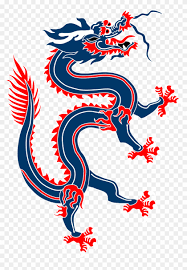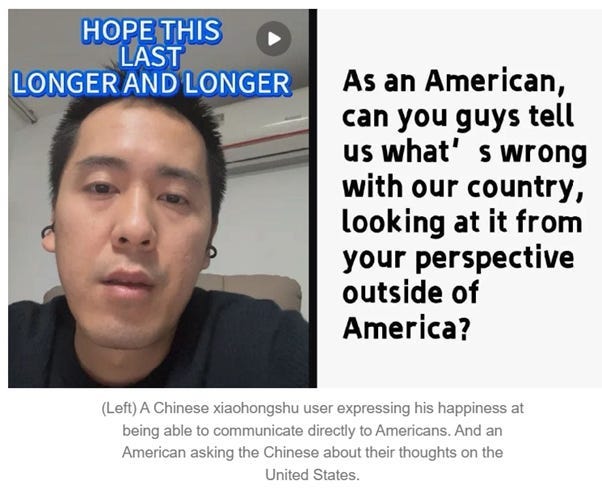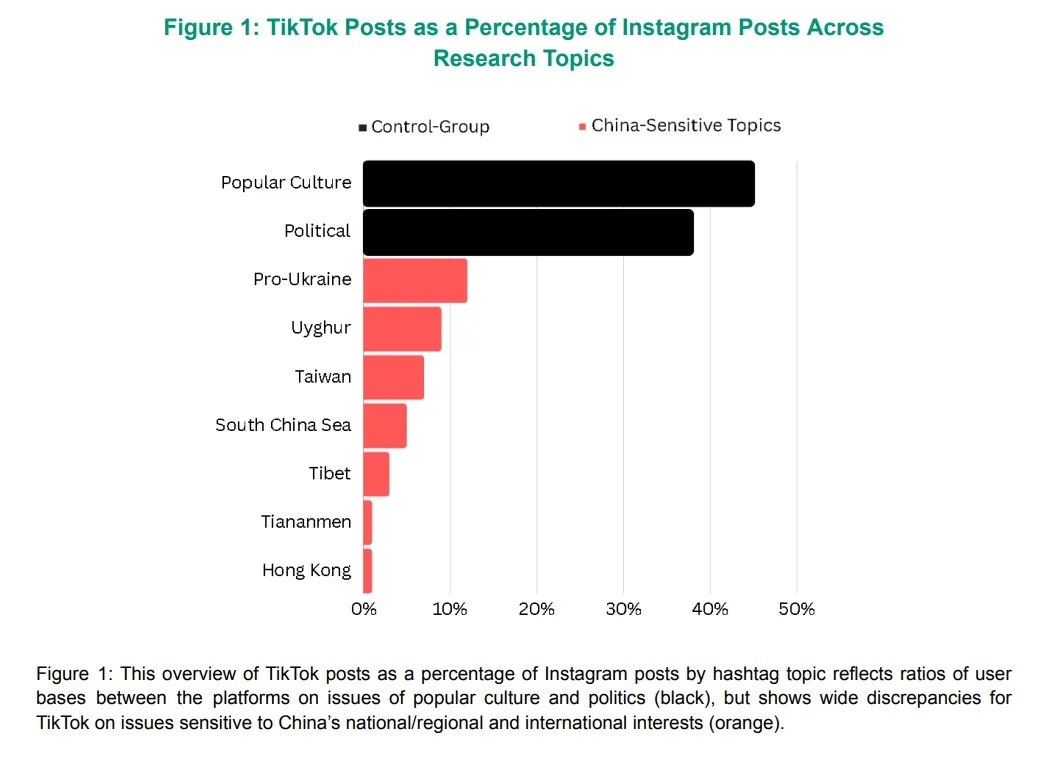In what for many has been a surprising and unforeseen development, American users are gravitating toward Xiaohongshu ("Little Red Book")—known as RedNote—a Chinese social media platform. In response to the looming TikTok ban, over half a million TikTok users flocked to it.
The move by users, many of whom rely on it as “influencers”, call themselves "TikTok refugees". This made RedNote the most downloaded app on Apple's US App Store on Monday.
Content creators to thrive on on it to build a sustainable community to be able to monetize their content. This is exactly why TikTok has won over half of the U.S. population. Many creators rely on it as a secondary or even primary source of income.
Amber Zhang, a popular young Chinese Substacker, describes how surprised Chinese RedNote subscribers were to discover that the App was suddenly flooded with many greetings from America. At first, thought they had opened the wrong app.
In her analysis she argues that these interactions haven't been limited to casual exchanges of funny memes and cat pictures. Americans and Chinese are comparing notes on cost of living, healthcare systems, work conditions, thoughts on history, capitalism, and their attitudes to Luigi Mangione.
Some Americans are requesting to see real pictures of Chinese streets. Many expressed surprise at the disparity between their previous perceptions and the reality they're discovering.
This movement goes beyond a simple act of protest; it has unintentionally sparked the largest unfiltered cultural exchange between Chinese and American internet users since the advent of China's digital firewall in the early 2010s.
Amid this, moments of authentic intercultural communication and culture sharing were plentiful. Many Chinese people joked about being Chinese spies and finally meeting the people they spy on. One of the videos going viral on Xiaohongshu is of a Chinese Trump impersonator. Don’t miss it – see it here.
Background
In April, the US Congress passed a bill that would force TikTok and other social media apps that are “controlled by a foreign adversary” to sell themselves to buyers in the U.S. or friendly nations. If the app won’t sell, they can no longer be legally downloaded from app stores. This so-called “TikTok ban” —(not really a ban, but a rule about corporate ownership) — was set to go into effect one day before Trump’s presidential inauguration.
TikTok’s Chinese parent company, ByteDance, refused. It appears that TikTok is apparently planning to shut itself down completely, going far beyond the penalty that the U.S. law itself stipulates.
TikTok plans to shut off its app for U.S. users on Sunday, when a federal ban on the social media app could come into effect, unless the Supreme Court moves to block it. If TikTok shuts off for all U.S. users, the outcome would be different from that mandated by the law. The law would ban new TikTok downloads on Apple and Google app stores, but existing users could continue using the app temporarily.
Chinese officials really don’t want the TikTok app leaving their control.
This indicates two important things. First, it indicates that Chinese authorities are making the decisions concerning TikTok. Not a surprise, because ByteDance is legally required to obey CCP directives.
Second, the refusal tells us that the Chinese government would rather see TikTok destroyed than see it fall into American hands.
One possibility is that it’s an attempt to make young Americans angry, in the hopes that they’ll demand that Trump and Congress repeal the 2024 law.
Sarah Fotheringham, a 37-year-old school canteen worker in Utah, says the move to RedNote is a way to "snub" the government.
"I'm just a simple person living a simple life," Ms Fotheringham told the BBC in a RedNote message.
"I don't have anything that China doesn't, and if they want my data that bad they can have it."
But a simpler explanation is that Chinese leaders simply think that TikTok, unlike other apps, is so important that they would rather destroy it than see it escape their control.
Why? Some supporters of the divestiture bill argue that TikTok will transfer Americans’ personal data to the Chinese government — something it has already admitted to doing in a few cases. Others are concerned with TikTok’s social harms. But the biggest concern is that by controlling the TikTok algorithm, the Chinese government might be able to propagandize America’s young people — and to silence Americans who say things it doesn’t like.
In fact, there’s some pretty strong evidence that TikTok already does exactly this. Rutgers University’s Network Contagion Research Institute has produced a number of papers about TikTok’s manipulation of information to suit Chinese government desires. The standard methodology is to compare topics on TikTok to similar topics on Instagram and YouTube. The NCRI people find that content on the different platforms is broadly similar, except where China-related issues are concerned. Here’s a chart from a paper back in 2023, comparing hashtags on TikTok and Instagram:
Source: NCRI
A more recent study revealed that content critical of China was made far less available than it was on Instagram and YouTube. More significant is that despite users engaging significantly more with anti-CCP content, a disproportionately high ratio of pro-CCP suggesting constant propagandistic manipulation.
In other words, the Chinese government is actively silencing the views of Americans who try to criticize it. But rich, influential opposition to the TikTok divestiture bill comes from those who benefit. The most prominent opponent, of course, is incoming President Donald Trump, who may have been swayed by a billionaire TikTok investor, or might believe that the TikTok algorithm has been tweaked to benefit him. Another is Elon Musk, who has expressed opposition to the ban, consistent with pro-China positions on a number of other issues. Bloomberg reported yesterday that China was considering selling TikTok to Musk, although the company denied the report. Together, Trump and Musk might conceivably find some way to bring the CCP-controlled video app back.
The court ruling is only hours away – and Trump rules the roost in a couple of days. What do you think is going to happen?
#TikTok
#China
#Xiaohongshu
#socialmedia
#influencers
#Trump
#ByteDance
#censorship
#TikTok ban
#TikTok refugees






